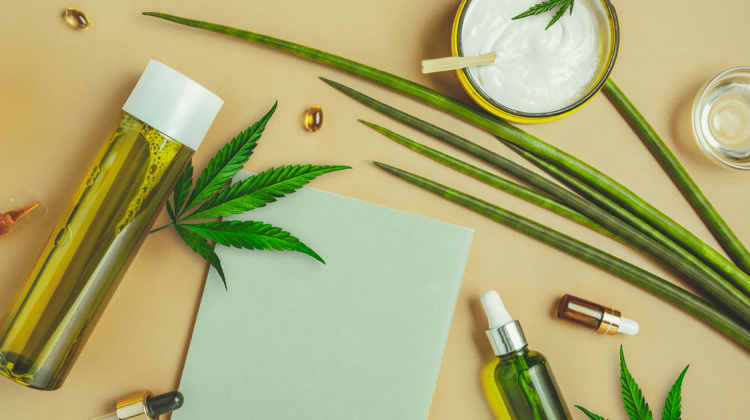Cannabidiol (CBD) has become increasingly important in the cosmetics industry in recent years. The natural ingredient can offer a range of benefits for skin and hair care and is being used in more and more products. This article looks at the benefits of CBD in cosmetics, current and future market developments, and the regulations governing the use of CBD in cosmetics in the EU.
CBD, short for cannabidiol, is a naturally occurring compound found in the cannabis plant. It is one of over 100 cannabinoids identified in cannabis, along with other compounds such as terpenes and flavonoids. The active ingredient CBD:
- is not intoxicating, meaning it does not have the psychoactive effects associated with cannabis use. Instead, it is known for its potential therapeutic benefits, which have been extensively researched in recent years.
- interacts with the body’s endocannabinoid system, which plays a role in regulating many physiological processes, including pain, inflammation, mood and sleep. The natural compound has been shown to be beneficial for a whole range of health conditions.
- is usually extracted from the leaves and stems of hemp plants, which contain very small amounts of THC, the psychoactive component of cannabis. CBD extracted from hemp plants containing less than 0.2% THC is legal in many countries, including the US and the EU, although regulations on the use of CBD in products such as cosmetics and food vary from country to country. Extraction from flowers is prohibited in most countries.
Natural benefits for body and skin
The biggest benefit of using CBD in cosmetics is its natural anti-inflammatory and antioxidant properties. These properties make it an ideal ingredient for treating skin conditions such as acne, eczema and psoriasis. It is also a powerful moisturiser, making it useful for dry and sensitive skin types. Studies have also shown that the ingredient can help reduce wrinkles and reduce the appearance of scars.
The ingredient also appears to have potential benefits in the area of anti-ageing: As we age, our skin loses elasticity and firmness, which can lead to wrinkles and fine lines. CBD has been shown to have antioxidant properties that can help protect the skin from the damaging effects of free radicals and reduce the signs of ageing. In addition to its antioxidant properties, the ingredient can help reduce redness and swelling of the skin. This can help give the skin a more youthful appearance. Overall, the natural ingredient’s potential anti-ageing properties make it a promising ingredient for a wide range of cosmetic products, including anti-ageing creams and serums.
CBD has also been shown to be useful in promoting blood circulation. Poor blood circulation can lead to a number of health problems, including varicose veins and oedema. It has been shown to have vasodilatory effects, which means that it can help to dilate blood vessels and improve circulation.
Improved blood flow can help deliver more oxygen and nutrients to the skin and other organs, which can promote overall health and well-being. In addition, improved blood circulation can help reduce dark circles and puffiness under the eyes, which in turn can improve the overall appearance of the skin.
CBD also has potential benefits for hair care and growth. It has been shown to help improve hair structure, reduce hair breakage and promote hair growth by stimulating the hair follicles. As mentioned earlier, the active ingredient interacts with the body’s endocannabinoid system, which regulates many physiological processes, including hair growth. It can help increase blood flow to the scalp, allowing more oxygen and nutrients to reach the hair follicles.
This can help promote hair growth and reduce hair loss. As the natural ingredient also has moisturising properties, in terms of hair care this can help to keep hair hydrated and healthy. In addition to its potential benefits for hair growth, CBD also has a calming effect on the scalp, which can help reduce stress-related hair loss. These effects make it a promising ingredient for a wide range of hair care products, including shampoos, conditioners and hair masks.
Increasing young market with development potential
The best-selling CBD cosmetic products are currently body care products. These include creams, lotions, balms, soaps and other products. Hair care products such as shampoos and conditioners and dental care products such as toothpaste and mouthwash are also popular. It is most commonly combined with other natural ingredients such as turmeric, hyaluronic acid, shea butter, jojoba oil, coconut oil and vitamin E. These ingredients offer a range of benefits for skin and hair, such as promoting skin hydration, improving skin elasticity, strengthening hair and protecting against environmental damage.
With the increasing popularity of CBD, the market for cosmetics containing this ingredient is also growing. According to a report by market research firm Grand View Research, the global CBD cosmetics market is expected to reach US$1.7 billion by 2025. This growth is driven by increasing demand for natural and organic products, and arguably by growing awareness of the potential benefits of CBD. According to an analysis by market research firm Mordor Intelligence, personal care products are expected to account for the largest share of the CBD cosmetics market by 2026, accounting for 60.2%. Hair care products are expected to account for 23.2%, while dental care products will account for 14.6%. Other categories are expected to account for the rest of the market.
Regulations and Guidelines
In the EU, cosmetics containing CBD are currently subject to the same regulations as any other cosmetic product. This means that they must meet the same safety standards as all other cosmetics, and must be tested for any potential side effects. Furthermore, the level of CBD in any given product must be clearly stated on the product label.
CBD used in cosmetic products is typically derived from leaves, and stems of the hemp plant. As mentioned at the beginning, extracting CBD from flowers for comsetic products is in most parts of the world forbidden, as flowers in most countries are part of the regulations around narcotic substances. In many countries he use of synthetically gained CBD is also allowed.
The hemp plant contains cannabinoids such as CBD, as well as other beneficial compounds such as terpenes and flavonoids. These compounds have been found to have a range of potential benefits for the skin, including antioxidant, anti-inflammatory, and moisturising properties.
CBD used in cosmetic products must be extracted from hemp plants that are grown in accordance with strict regulations. In the EU, hemp used for the production of CBD must contain less than 0.2% THC and must be grown in accordance with EU regulations for agricultural products.
The extraction of CBD from the hemp plant typically involves using a solvent such as ethanol or CO2 to extract the cannabinoids and other beneficial compounds. The resulting extract can then be formulated into a variety of cosmetic products, including creams, serums, and oils.
However, the EU has strict regulations regarding the labelling and marketing of cosmetic products containing CBD. According to EU regulations, cosmetic products must be safe for human use and must not contain any ingredients that are harmful to human health. In addition, cosmetic products must be properly labelled and marketed, and companies must not make any false or misleading claims about the benefits of their products.
In order to ensure compliance with these regulations, companies that manufacture or sell CBD-infused cosmetic products in the EU must follow strict guidelines for quality control, testing, and labellling. These guidelines include adhering to good manufacturing practices, conducting safety assessments, and using appropriate labeling and packaging.
Overall, the regulation of CBD in cosmetic products in the EU is complex and subject to changes, like the rest of the CBD markets. Companies that manufacture or sell CBD-infused cosmetic products in the EU must stay up-to-date with the latest regulations and guidelines in order to ensure compliance and provide safe and effective products to consumers.
Conclusion
Overall, CBD is proving to be an increasingly popular ingredient in the cosmetics industry, offering a range of benefits for skin and hair care. As the market for these products continues to grow, it is important to ensure that all products containing CBD meet the necessary safety standards and regulations. When the right precautions are taken, CBD cosmetics can be an addition to any beauty routine.
Even though CBD cosmetics are becoming more widely available, it is important to remember that it is not a miracle product. As with any other product, it is important to do your research before purchasing and use the cosmetics as directed. It is also important to know that CBD is not meant to diagnose, treat, cure or prevent disease.
As CBD becomes more popular, it will be interesting to see how the market for CBD cosmetics develops. With the right regulations and safety measures, this could be an area of the beauty industry that continues to flourish.
Click here to view Herbalea’s profile and learn more about their CBD offering.

